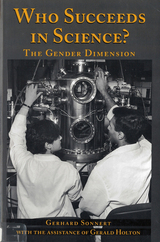
What determines successful careers in the field of science? What are the early indicators of later failures. And specifically, how do women scientists' career paths differ from men's? While it is easy to theorize about these questions, those who go to the trouble of an extensive empirical study find an increasingly complex picture.
Using the largest database of its kind (699 questionnaires and 200 face-to-face conversations), the authors investigate the career paths of recipients of prestigious postdoctoral fellowships--scientists, engineers, and mathematicians. They outline a theoretical framework for understanding the causes of gender disparities among scientists, test the hypothesis of a gender- specific "glass ceiling," and provide a wealth of pertinent statistical information.
Gender Differences in Science Careers reveals that, as institutional laws changed, patterns of discrimination and exclusion become more subtle. Despite the decline of rigid gender-role socialization, many social practices persist that lead, on average and often in counterintuitive ways, to the accumulation of disadvantages for women scientists. This book is directed to scholars in the social sciences, aspiring and practicing scientists, and administrators interested in equity issues.

Why don’t more women become scientists? And why do those who do become scientists often face more difficulties than their male counterparts? Every year, about a quarter of a million young men and women in the United States receive their first academic degree in science, mathematics, or engineering. A small fraction will eventually become research scientists. But many who start out with that goal fail to reach it––for reasons that may have less to do with their scientific ability than with their gender.
Drawing on a wealth of information (699 questionnaires and 200 interviews) from men and women who gave every promise of scientific achievement, Gerhard Sonnert and Gerald Holton illuminate the partly gender-driven dynamics of “the leaky scientific pipeline.” At the heart of this book are gripping personal life stories of ten women and ten men: half became highly successful scientists, the rest left research science. In their own voices, they talk candidly about their career paths, the obstacles and assists they encountered, the difficulties and rewards of attempting to combine a family life with a science career.
This highly readable analysis of the gender dimension in scientific careers––and its clear-headed advice––will be of great interest to everyone considering a career in science as well as to teachers, parents, and active scientists. Academics in sociology of science and gender studies as well as decision-makers in the areas of human resources and science policy will also welcome its discussions of general issues and policy recommendations.
READERS
Browse our collection.
PUBLISHERS
See BiblioVault's publisher services.
STUDENT SERVICES
Files for college accessibility offices.
UChicago Accessibility Resources
home | accessibility | search | about | contact us
BiblioVault ® 2001 - 2024
The University of Chicago Press









